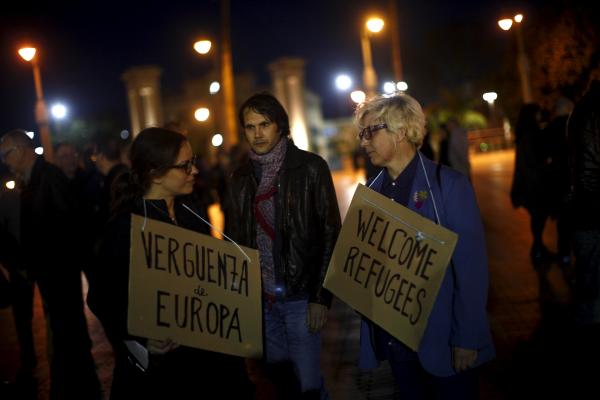
People stand during a protest against the EU-Turkey migrant deal in Malaga, southern Spain, March 16, 2016. The sign (L) reads, “Shame of Europe”. REUTERS/Jon Nazca
As hundreds of migrants tried to reach the Greek island of Lesbos on Friday, Turkish authorities intercepted hundreds them in a major operation involving coastguard ships and helicopters, as European leaders settled an agreement with Ankara to halt illegal migration.
Around 1,200 migrants, many detained at sea and the others in hostels and streets on Turkey’s Aegean coast, were being taken to a sports hall in the town of Dikili, Reuters cited a senior local security official.
Officials said that the migrants, mostly from Syria and Afghanistan, would be asked to determine their backgrounds and what action would be taken next.
“I think there are many people running from war to Europe, and I guess it’s a (problem),” said Issam Katib, 27, who fled from Damascus and was among those detained.
He reflected a widely held view among the migrants that if they could reach the Greek islands they would then be free to settle in Europe.
“If Turkey gives us the right to choose the country to live in, it is ok, but I think … in Greece we have the right to choose,” he told Reuters, speaking in English. “We all need (to go) a legal way, maybe not by the sea.”
In Brussels, European Union leaders agreed on a controversial deal with Turkey intended to halt illegal migration to Europe in return for financial and political rewards for Ankara.
Following a morning of talks with Turkish Prime Minister Ahmet Davutoglu, European Council President Donald Tusk recommended that the 28 EU member states approve the text without changes and they rapidly agreed at a summit lunch in Brussels.
“All new irregular migrants crossing from Turkey into Greek islands from 20 March, 2016, will be returned to Turkey,” Reuters reported after seeing the draft joint EU-Turkey statement. “This will take place in full accordance with EU and international law, thus excluding any kind of collective expulsion.”
It did not say whether this would entail changes in Turkish legislation.
The accord aims to close the main route a million people used to cross the Aegean Sea to Greece before marching north to Germany and Sweden in the last year. But deep worries remain about whether it is legal or workable.
More than 2.7 million Syrian refugees are settled in Turkey, and for many of them, the attraction of Europe is unlikely to diminish once the agreement takes effect. People traffickers are likely to focus on new routes, officials fear.
“We left Syria and came to Turkey, but life here is expensive and difficult … We want to go to Europe and for someone to help us a little,” said Qasser Shaouk, a migrant in the Basmane district of Izmir, the main city on Turkey’s Aegean coast.
